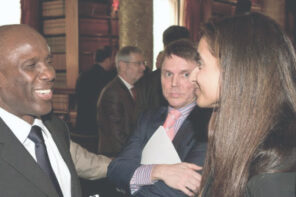
Monday March 25, 2024
Building Resilience Through a Corporate Affairs Lens
5 mins
The corporate affairs function is increasingly broad and continuously evolving. As it concerns itself with all aspects of internal and external communications, it facilitates and maintains connections with all of the organisation’s stakeholders, including the public, media, government bodies, investors, and employees. Thus, the responsibility of connecting with these stakeholders falls disproportionately on a corporate affairs professional, and it is pivotal they recognise the risks and opportunities in the dynamic field.
In recent years, corporate affairs professionals have been increasingly preoccupied with the topic of resilience. It is crucial in an era of permacrisis and disruption, where the media is becoming increasingly fragmented, misinformation and disinformation are rampant, geopolitical instability is widespread, and economic uncertainty is pervasive.
In this blog, we will delve into the considerations of building resilience through the lens of corporate affairs, drawing on insights from the Saïd Business School, University of Oxford’s Corporate Affairs Academy report.
Understanding Reputations
The introduction of digital media, such as social media, podcasts, and streaming services, on top of the traditional forms of media, namely print and television, means that the media has become more fragmented. This trend will only continue as new platforms and technology are introduced.
Not only that, but information is being disseminated faster than ever before — all thanks to AI. Due to this, there is a lot more noise for communicators to navigate through, and reputations are becoming increasingly vulnerable.
Read more: How to Fight AI-Powered Misinformation and Disinformation.
As reputations can make or break an organisation, it’s important to ensure that a positive reputation is maintained. To understand how to build and protect an organisation’s reputation, we must first examine whether the narratives have been formed through a lens of character or capability.
Capability reputation is centred on an organisation’s capabilities, covering aspects such as skills, resources and other competencies related to the quality and effectiveness of its operations. One example of such an organisation is Amazon, which has a reputation for delivering goods promptly.
On the other hand, character reputation is how people perceive an organisation’s potential behaviour with respect to its intentions and goals. The emphasis is on its values and characteristics as opposed to company performance. An example of this can be seen from Patagonia, which was ranked as the most respectable brand of 2023 due to how the brand fulfils its duty of ESG by preserving and repairing the environment and in the way it champions the causes it supports.
In an interview with the Economic Times, Founder and Director of Oxford’s University Centre for Corporate Reputation and Chair of the Enacting Purpose Initiative Rupert Younger says, “Corporate character is very important when it comes to counterparties like investors and suppliers, while capability is the lead indicator when it comes to consumers.”
Capability reputation is more stable and hard to waver, while character reputation is quick to be affected in light of a crisis. Therefore, an organisation must have a different approach to both: either improving their products and services to enhance capability or focusing on governance for the character.
To Be Reliable or to Be Adaptable?
There isn’t a one-size-fits-all formula to corporate affairs, as organisations in various industries have different circumstances and needs. Instead, corporate affairs practitioners are urged to assess whether the organisation should prioritise the past, present or future. While the former two entail that an organisation prioritises reliability, the latter has to do with adaptability.
A participant details in the Corporate Affairs Academy report:
“All our [group’s] organisations are focused on being reliable and less so on being adaptable, for resource reasons. But looking at the past, present, and future, our organisations are vastly different. [As a financial organisation] X is focused on the present – very little focused on the future because of its financial position. If we don’t focus on the present, we may not survive to get to the future. But the other three organisations [two tech, one media] were really focused on the future because of the nature of their business.”
Essentially, Businesses that are subject to various regulations prioritise the present while also looking to the past for confirmation and validation. Meanwhile, those who look into the future are known as disruptors or innovators and would benefit from strategic forecasting to stay ahead of trends, manage their reputation, and survive.
Read more: Strategic Forecasting – PR’s Tool-Kit Essential.
Taking on the Role of a corporate Antenna
Acting as the organisation’s radar is to scan the horizon for risks that may arise, thus preparing an organisation for a crisis before it emerges in such a volatile landscape as today. However, rather than merely identifying threats, corporate affairs professionals should also take a proactive stance, scanning the horizon to contribute strategically.
Corporate affairs professionals can do this by continuously fostering a two-way culture of feedback by giving feedback within the organisation and also receiving feedback from external stakeholders such as partners or the media.
As corporate affairs oversee a broad range of disciplines, it becomes vital for professionals to collaborate with stakeholders to harness as many insights from different expert viewpoints as possible. An example of this is working together with economists to get the full picture of what is happening in the economic landscape or legal advisors to be cognizant of government policies to ensure that all risks are being taken into consideration.
On the other hand, the quality of media coverage and the sentiment found can serve as feedback and tangible data to be incorporated into strategy meetings. For example, did the media criticise your organisation’s ESG commitments? Perhaps it’s time to reevaluate your approach to ESG.
The main takeaway is that, as the corporate landscape evolves and we enter into an increasingly uncertain period, it becomes more crucial than ever for corporate affairs professionals to consider a holistic approach in integrating resilience throughout their communications strategy.
Curzon PR is a London-based PR firm working with clients globally. If you have any questions, please feel free to contact our Business Development Team bd@curzonpr.com







Follow us